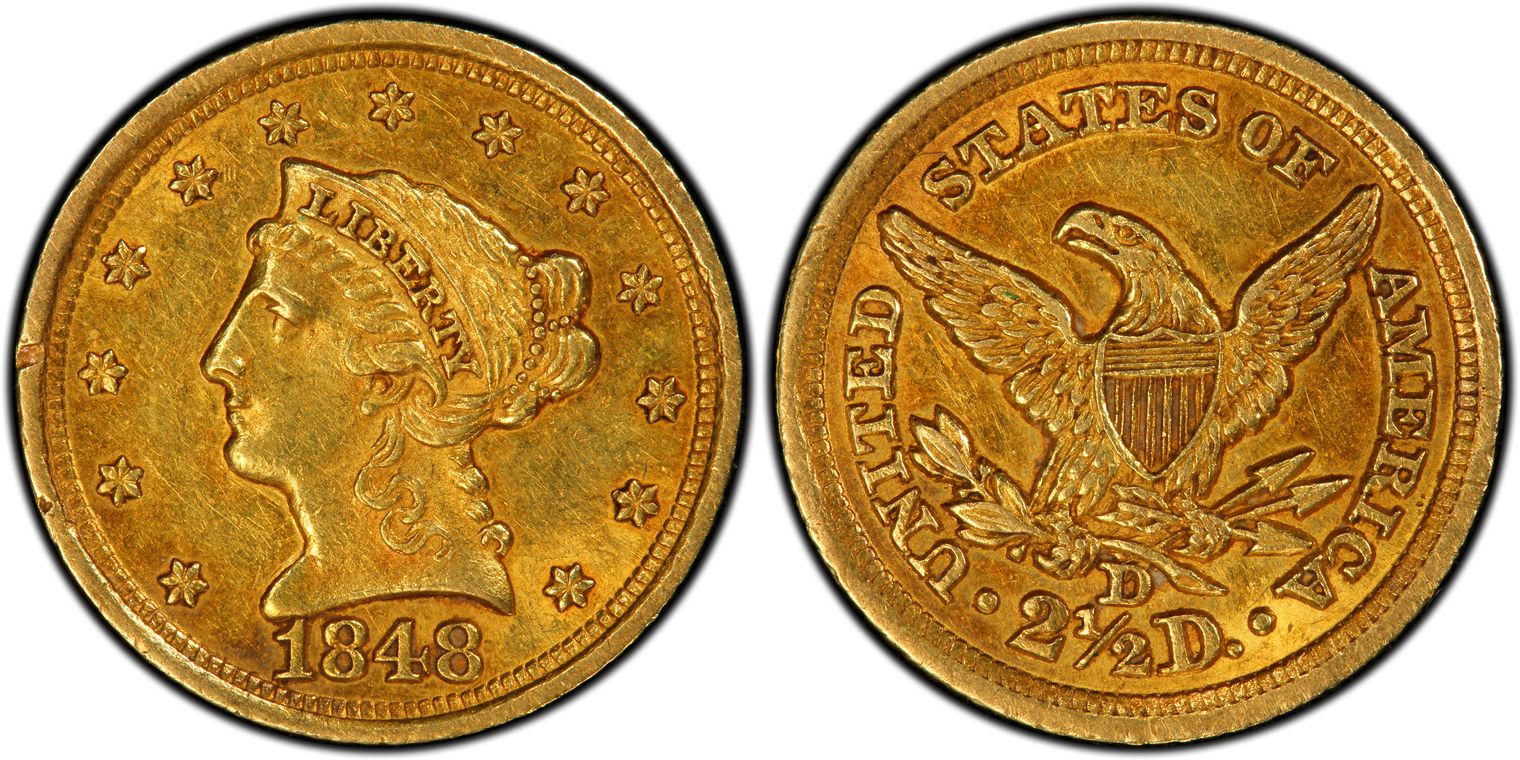1848-D $2.50 AU55 认证号18588604, PCGS号7751
拥有者评论
CAC - Coinfacts reddish-gold and honey hues.
专家评论
David Akers (1975/88)
Although its mintage is lower than that for the 1848-C, both the auction data and my own experience indicate that the 1848-D is more common, particularly in grades of AU or Unc. Most examples of the 1848-D that I have seen are fairly well struck, certainly more sharply so than the typically seen 1848-C, and the difference in striking may account for some of the apparent difference in availability of high grade specimens. Nevertheless, the 1848-D is definitely more common than the 1848-C, although they seem to bring about the same amount when offered for sale. By a slight margin, the finest specimen I have seen was the one in the Mathey collection that was sold in the 1973 NASC Auction.Doug Winter
In recent years, the 1848-D has earned the reputation as being one of the most common Dahlonega quarter eagles. While it is not a great rarity, it is actually much scarcer than believed, especially in high grades.The 1848-D quarter eagle is typically available in Extremely Fine grades. It is scarce but obtainable in the lower About Uncirculated grades. It becomes rare in the higher About Uncirculated grades and it is very rare in Mint State.
STRIKE: This is one of the final Dahlonega quarter eagles that can be found with a good strike. The obverse is very boldly impressed. The hair detail is sharp with just a bit of weakness on the curls and the bun. The stars are well-formed and sharp although the fourth through the eighth are sometimes a bit lighter than the others and appear a bit more delicate. The denticles are very bold as well. The reverse is a bit less sharp than the obverse. The eagle shows good detail with the exception of the right leg which is weak. The reverse has moderate to pronounced weakness on the denticles. A number of 1848-D quarter eagles have light clashmarks at the throat of Liberty.
SURFACES: The typical example has much nicer surfaces than many other Dahlonega quarter eagles produced in the 1840’s. There are enough higher grade pieces with relatively few marks around to strongly suggest the one-time existence of a small hoard. This is not to say that this date is commonly found with clean surfaces as many have deep, detracting abrasions or hairlines from having been cleaned. Others show raised mint-made die scratches on the reverse. These should not be mistaken for hairlines.
LUSTER: The quality of luster seen on higher grade 1848-D quarter eagles is above average. Most have very frosty mint luster with a slightly grainy texture.
COLORATION: Uncleaned, original examples have been observed with color which ranges from bright yellow-gold to rose to deep coppery-orange. It is very hard to locate an 1848-D quarter eagle that has not been cleaned or dipped.
EYE APPEAL: It is still possible to find an attractive 1848-D quarter eagle. There are some known which combine very good strikes and clean surfaces with outstanding color and luster. These are always in demand among type or date collectors. However, most have had their surfaces stripped in recent years.
PERSONAL OBSERVATIONS: For many collectors, the 1848-D quarter eagle makes an ideal type coin. This is among the best prepared issues from this mint with many displaying a good strike and good luster. This issue remains relatively available in the lower to middle About Uncirculated grades but it has become very hard to locate in the higher About Uncirculated grades.
DIE VARIETIES: Two die varieties are known.
Variety 10-M: This variety uses Reverse M which is described above under the 1847-D quarter eagle. Some examples are known with the reverse rotated 45 degrees or more.
This is the more common of the two varieties.
Variety 10-N: Both varieties share the same obverse. On this obverse, the 1 in the date touches the bust while its base is very close to the denticles. The second 8 in the date is much closer to the denticles than the bust. The reverse was used only in 1848. The shaft of the arrow is joined to the mintmark at the right edge of its upright. The fraction bar extends to the center of the opening in the mintmark. Feathers fill the upper part of the opening in the mintmark and extend down to near the center of this opening. This reverse is very similar in appearance to Reverse H. The major differences are that on Reverse N the feathers within the opening of the mintmark are bolder, the lower serif of the mintmark is closer to the upright of the 1 in the fraction and none of the vertical stripes in the reverse shield extend up into the horizontal shield stripes.
This is the scarcer of the two varieties of the year.
PCGS #
7751
设计师
Christian Gobrecht
边缘
Reeded
直径
18.00 毫米
重量
4.18 克
铸币数量
13771
金属成分
90% Gold, 10% Copper
更高评级数量
58
评级较低的钱币数量
99
地区
The United States of America
价格指南
PCGS 数量报告
拍卖 - PCGS 评级的
拍卖 - NGC 评级的
稀有性和存量估计 了解更多
| 所有评级 | 195 |
| 60或以上 | 15 |
| 65或以上 | 0 |
| 所有评级 | R-7.0 |
| 60或以上 | R-9.3 |
| 65或以上 | R-10.1 |
| 所有评级 | 74 / 147 TIE |
| 60或以上 | 78 / 147 TIE |
| 65或以上 | 1 / 147 |
| 所有评级 | 74 / 147 TIE |
| 60或以上 | 78 / 147 TIE |
| 65或以上 | 1 / 147 |
状况普查 了解更多
|
#1 MS63 PCGS grade
Heritage 6/2008:1824, $27,600 |
|
#1 MS63 PCGS grade
Chestatee Collection - Heritage 8/1999:7648, $28,750 - Green Pond Collection - Heritage 1/2004:1026, $23,575 - Heritage 4/2014:5693, $25,850 |
| #1 MS63 PCGS grade |
| #1 MS63 PCGS grade |
| #1 MS63 PCGS grade |





















